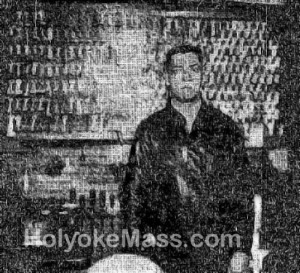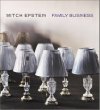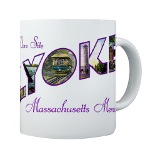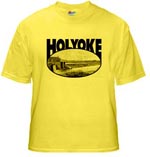by Laurel | October 16th, 2014
14 October 1928
Locksmithing Runs in Family — Not Much money But Careful of Patronage
Has Just Purchased His First Machinery
Shaper Will Turn Out Keys For Autos Quickly But License Must Be Shown to Avoid Crook Danger
Holyoke, 13 Oct 1928 — Locksmithing, like many other trades seems to run in a family. Thus Frank Rackliffe‘s grandfather, William Rackliffe, was a locksmith in Middletown, CT. His father was a blacksmith; he has a cousin, a locksmith in Springfield, and if the Rackliffe genealogy was to be looked through doubtless a baker’s dozen would appear. It was 20 years ago since Frank J. Rackliffe came into Holyoke with a kit of tools and a lot of ambition. he is located now in the same place, 219 High Street, where he first hung out the enormous key, the insignia of his profession 20 years ago.
Holyoke has changed much since then; and Frank has kept up with the times. Why, the other day he put in a little machine by which he can turn out quickly any make of automobile key — cost $300 for machine and some more for extras but it does the work. “Aren’t you afraid you’ll be making keys for automobile thieves or other crooks?” was asked him this week. “Not a chance,” answered Frank in that positivetone that marks the man who is master of his job: “If I don’t know the man or woman I ask them for their operating license. That protects me and the public.”Not only has he this machine but two others, one invented by himself and used in certain kinds of work that required special machinery. He has no less than six motors — small ones of course — in his little shop. Lest some one might think that there’s millions in the business, Frank says very outspokenly that there’s just a living, nothing more. “Why today up to this afternoon,” he said, “I took in just 90 cents. Once in a long while a big safe job comes in with $25, $50 or $100 for the work according to size and value of the work.
Just then a man came in and wanted two duplicate keys made to a rather unusual looking key. Frank looked it over with a sharp appraising glance. “You can have them in about 20 minutes,” he said. After the man went out he held it up. “This key was made in San Francisco,” he remarked. “This special little machine that I designed for work of this kind will come in handy,” and he turned upon it. As the keys were being formed, Frank continued. “Thee are about 25 lock manufacturers in the country. I have blanks for about every key they make. In fact I have an overstock of blanks now and shall not buy any more this year. I’ve been cutting down on blanks for some time and don’t carry as many as I used to.
“How many blanks and finished keys have you on hand now?”
“Well, I should estimate something like 15,000, or 20,000. Some o the more common kinds I keep made up. You see I can tell the make of an automobile key across the room. Then he showed a great lot of smaller keys for valises, trunks, suitcases and carious kinds of bags. “I also have the measurements of many small safes in the city. If they lose the key of the lock goes wrong. I can turn to my data and get a key for them. It is quite a study of how to open safes.”
He then told of opening the Dietz Banking Company safe the time the place was robbed some years ago. The burglars could not get into the safe. Frank did it in an hour or so. “You have to know where to bore in to get at the safe lock,” he explained. “After you get it fixed you plug up the hole, paint over the place and you would never know that it had been touched.
“I see a man of your name opened a safe in Springfield within a few days.” “Yes,” said Frank, “after he had come to me and got a drawing of just what to do. One has to make a study of such things to be an expert. The fine art of the business is to be exact,” said Frank. “The key must not only be made like the original but must be made so exactly that it will not stick or bind. And that is where the difference of the work of skilled locksmiths and amateurs or half baked ones in the business lies.”
Truly Frank. L. Rackliffe is a key man in Holyoke. he s so well known here that if you ask amost any one where to go for a key or to open a safe and “Frank Rackliffe” is the almost instant rejoinder. For that is what it is to be master of one’s job.
Among his other treasures are a bunch of large rusty keys on an iron ring over 100 years old. “Mount Holyoke Colletge borrowed these one time for a play,” he said. “Keys like other things get out of date and become so much old junk. He waved his pipe toward a frame with hundreds of keys on it. “That there for instance is almost all keys and key blanks of discarded locks. hey are practically no use. Not a call for them once a year.” Frank has bought out three locksmiths during the past 20 years. He has their stock with his own. One concern he bought out had two bushels of spoiled keys. He snorted with disgust as he mentioned it. “No man who does work like that has a right to call himself a locksmith,” he said.
“What keys are the hardest to duplicate?” “The Chinese have individual keys with little springs that are very hard to make,” he said. “Fortunately we see very few of them.” “Do you take wax impressions when a key is lost?” Frank snorted again, “Applesauce!” he remarked. “You read about such things in stories. Also about opening safes by listening to the tumblers fall. Such safes as can be opened in this way are very ancient. In the older type there was a pin that fell when the tumblers were all set just right for it; and this made a noise you can hear. But modern locks do not have this sound at all. one could listen carefully and get the combination that way in the older safes, but not today’s safes.”
In case a man loses a key and cannot find any other it becomes necessary for Frank to hustle out to the house or wherever it is and take a lock apart and find what key is needed. Probably the average citizen wouldn’t know what to do if the lock was taken apart as Frank does. It is to him like reading an open book.
Adapted from The Springfield Republican.









